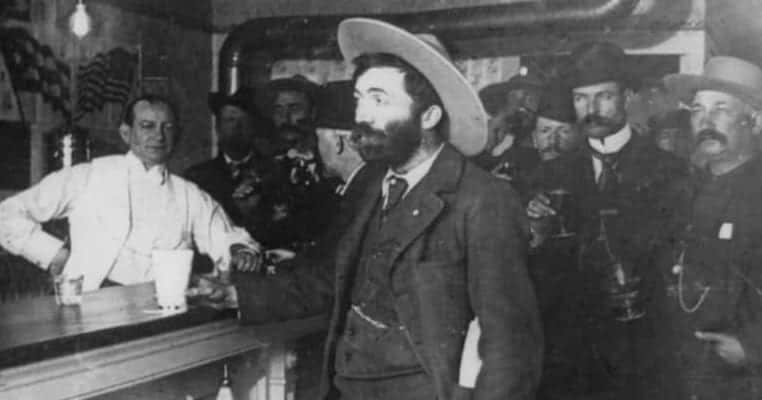Jefferson Randolph Smith was born in the antebellum Southern state of Georgia. His family was both wealthy and influential in Georgia politics. His grandfather, a state legislator, owned a large plantation in Coweta County, not far from Atlanta. Smith was not yet five years of age when Union troops under Sherman ravaged the city and surrounding areas, and his family was financially ruined following the Civil War. His father, an attorney by profession, relocated to the west, settling in Round Rock, Texas in 1876. Smith was then 16. Two of Jeff’s brothers followed in their father’s footsteps, taking up the practice of law. Three other brothers followed the medical profession.

Jefferson Smith followed a different path. After a brief attempt at earning a dollar honestly (more or less, he worked as a salesman), Smith discovered a gift for the small con. He practiced until he was equally gifted at the long con. He eventually worked as a confident man and gangster, creating organized crime rings in three western cities. Discarding the idea of an honest career he embarked on a dishonest one which included graft, theft, bribery, and extortion. He hired pickpockets and muggers, burglars and petty thieves. He operated a gambling hall in Denver, the Tivoli Club, which became notorious for rigged games. Here is the story of Jefferson Randolph Smith, known to friends, enemies, and victims as Soapy Smith.
1. He started his professional life as a traveling soap salesman

Shortly after his family’s arrival in Texas, Smith’s mother died. He began to travel to the booming mining and cattle towns, selling bars of soap to the miners and townspeople. The miners weren’t a bunch overly concerned with personal hygiene, so Smith made it more interesting for them. He announced when he set up his wagon in a new town that one out of ten of the soap bars contained a bill inside. The denomination was either $20 or $50. Smith sold the bars for $1 to $5, depending on the size. Someone always bought a bar with the larger denomination bill inside, creating great excitement and enhancing sales considerably, and Jeff Smith became known as Soapy Smith.
The winner of the stuffed soap bar was invariably in Smith’s employ, meaning that Soapy was soaking his customers at the same time. When he was finished selling soap, Smith entertained his customers and others who happened by with the thimble game. The thimble game, involving three thimbles and a pea, was one of the street hustler’s oldest tools, but Smith had already reassured the crowd of his honesty through his soap dealings. Soapy also hustled cards and pool games on his travels in and around Colorado, gradually adding to the soap scam a prelude in which he allowed the customers to see him wrap the bills into the soap before opening for business.

